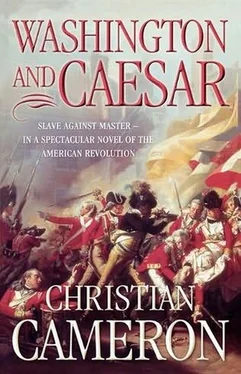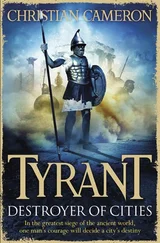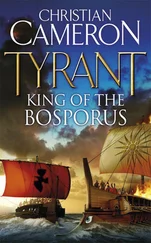Christian Cameron - Washington and Caesar
Здесь есть возможность читать онлайн «Christian Cameron - Washington and Caesar» — ознакомительный отрывок электронной книги совершенно бесплатно, а после прочтения отрывка купить полную версию. В некоторых случаях можно слушать аудио, скачать через торрент в формате fb2 и присутствует краткое содержание. Год выпуска: 0101, ISBN: 0101, Издательство: HarperCollins, Жанр: Исторические приключения, на английском языке. Описание произведения, (предисловие) а так же отзывы посетителей доступны на портале библиотеки ЛибКат.
- Название:Washington and Caesar
- Автор:
- Издательство:HarperCollins
- Жанр:
- Год:0101
- ISBN:9780007389698
- Рейтинг книги:3 / 5. Голосов: 1
-
Избранное:Добавить в избранное
- Отзывы:
-
Ваша оценка:
- 60
- 1
- 2
- 3
- 4
- 5
Washington and Caesar: краткое содержание, описание и аннотация
Предлагаем к чтению аннотацию, описание, краткое содержание или предисловие (зависит от того, что написал сам автор книги «Washington and Caesar»). Если вы не нашли необходимую информацию о книге — напишите в комментариях, мы постараемся отыскать её.
Washington and Caesar — читать онлайн ознакомительный отрывок
Ниже представлен текст книги, разбитый по страницам. Система сохранения места последней прочитанной страницы, позволяет с удобством читать онлайн бесплатно книгу «Washington and Caesar», без необходимости каждый раз заново искать на чём Вы остановились. Поставьте закладку, и сможете в любой момент перейти на страницу, на которой закончили чтение.
Интервал:
Закладка:
Lee pointed. “Clinton is marching back to New York. The British can call it anything they like, sir, but it is a retreat. With all due respect, we gain nothing by attacking him and little by interrupting his retreat. The risk to us is great, however. Right now, every man in New Jersey is ours. Since Saratoga, the tide of Congress is running high. We cannot afford a defeat. If we attack his rearguard, we will be defeated. Our troops cannot stand the fire.”
Washington looked around the room. Lee seemed to have polarized the officers of the army, recently so united, and Washington vowed silently that this would not happen again. He looked at the marquis. Lafayette, recovered from his wound and entirely unchanged, uncrossed his legs and popped out of his seat like a marionette.
“I would be delighted to take our advance guard and have a passage a l’outrance, General. I do not agree with the General Lee. I believe that my men will stand the fire.”
Lee looked at him disgustedly.
“When have they yet, sir?”
“You were not at Trenton or Princeton, sir, nor Brandywine.”
“I wasn’t at Saratoga, either, sir! But by God, even the veterans of those actions admit that they couldn’t stop the British when they came on with the bayonet! Right up until he surrendered, Burgoyne was still winning his victories! We cannot afford one of those defeats. We have a good new army and a great deal of public support and a treaty with France. We’ve won! Let’s keep it. Let’s shadow Clinton all the way out of New Jersey and claim victory.” He turned a look of repugnance on Lafayette. “And let’s leave him in the nursery where he belongs.”
“Contain yourself and apologize!” Washington spoke in a voice of thunder. Lee recoiled. Washington stood to his full height, towering over Lee.
“I beg pardon, sir. The hurry of the moment…”
“Ce n’est rien, General Lee.” Lafayette was always magnanimous. It was one of the reasons so many of the officers hated him.
“General Lafayette, you may take the advance guard under your command. Give me a plan to attack the rearguard of General Clinton’s army and make an attempt on his baggage.”
General Lee took a deep breath and swept his head around the room. There were a number that looked to him for leadership. He had gathered a small crowd on his side, distinct from the crowd around Washington. After the victory at Saratoga, there had been a conspiracy to place Gates at the head of the army, but it had failed in part because so few officers knew Gates, or liked him. The same was not true of Charles Lee. A great many officers in the army admired him.
“Very well, sir. If you insist on this mission, I will undertake it rather than entrust it to an officer so inexperienced, no matter how good his heart.”
Washington looked at Lee with thinly disguised misgiving.
“Very well, General Lee.”
“But I will not guarantee the outcome.” Lee was sarcastic. Washington wondered if he had allowed this behavior before or if captivity had changed Lee.
“I seem to remember you feeling that I lacked decision on a former occasion, General Lee.” Lee grew pale. Washington seemed an extra few inches tall. “Don’t let me find you the same, General.”
Washington held his gaze until Charles Lee turned away.
Near Monmouth Court House, May 28, 1778
Marcus and Polly had always been sure they would return to New York, but Caesar had hoped that the war was going better than that. Early spring proved them right. Once the orders to move back to New York came to them, he hoped that they would sail home, as they had come, but they were ordered to march. The women were ordered into boats along with the heavy baggage and most of the stores, but the army stepped off from Philadelphia, leaving it to the rebels, and headed for New York. In the dark of the first morning’s march, Caesar felt that the war was lost. They had taken the rebel capital and the victory had not had any real effect. There were rumors that the French would now declare war on England and they would all be on the defensive. Caesar saw his chances of a life of freedom marching away into the dark like Clinton’s retreating army.
The march was orderly, but they were attacked every night in New Jersey and many of the days, as well. Militia rose up out of the ground to contend the flanks, and every patch of woods had its garrison of local men. They took casualties, enough to make the men angry, and they were in action or worried about it every day.
Soon enough, they began to encounter more than just militia. Twice they found ambuscades laid by regular troops, and one whole day they skirmished with mounted dragoons who dogged their patrols just out of musket range, looking for an opening. During those days, Caesar began to rely on the green-coated men of Simcoe’s new regiment, the Queen’s Rangers. They had their own cavalry and their own riflemen, and twice his patrols were saved by their timely appearance. There were black men in the ranks of the Rangers, and in several other units, now.
The pressure on the Guides mounted every day. They lost two men in a day, killed by rifles at a distance, and the next day a new boy, Dick Lantern, who had been an ostler in Philadelphia, was captured when he strayed too far out of the pickets in the evening. They all knew he would be sold as a slave. It added to their fatigue and their frustration.
Caesar felt that Washington was following them like the hunter he was. He wondered when Washington would pounce.
The day started hot. The night before had been warm and so damp that Caesar’s men lay on their muskets to keep them dry. The rebels had driven some cattle herds right through the outposts, scattering sentries and luring them to fire, which alarmed the camps and kept the men awake.
It was the last alarm, just as the false dawn started in a dark morning already too hot for comfort, when the sentries nearest the light infantry began to fire. Caesar sprang up, more in anger than in fear. He’d suspected for an hour that the soldiers of the regiment on duty were inexperienced ninnies, and this confirmed it. No one around his fires seemed to be asleep anyway and he roused them and got them into their equipment while he sent Jim Somerset to find an officer. As the first light appeared in the sky, Jim came back with Jeremy, who was wide awake, dressed, and leading a horse.
“I want to take a patrol out and make ’em pay for keeping me awake,” said Caesar. “Apparently these heroes,” he pointed to a soldier of a line regiment slouching in a filthy red coat, “don’t have the spirit to do the job.”
Jeremy nodded and rode off, returning shortly with a German officer and Lieutenant Crawford. Caesar was surprised to find that the German officer spoke perfect English.
“We was troubled all night. We’d be delighted to sweep the ground in front of us now that there is light to shoot.” The German officer waved over the low ground to their front. He looked at Caesar and inclined his head in measured civility.
“Captain George Hangar of the Jaegers.”
“Sergeant Julius Caesar of the Black Guides. Your English is very good, sir.”
“Damn! I might say the same, sir. But I’m English myself. Just happen to serve in the Jaegers. Love the rifles, you see.”
Lieutenant Crawford was looking through his glass at the ground. A ball came past them, announced by a hiss. A second ball struck a stump and sent up splinters. Hangar knelt by the stump eagerly and dug at it with his clasp knife before extracting a ball.
“Rifles, of course. You know how long the barrel is compared to the weight of the ball? All that metal means that they can load more powder, eh? That barrel must weigh a full six pound, and that will allow them to shoot more than half the weight of the ball in powder. Even a small ball like this will carry three hundred yards. And the long barrel means all the powder is burned.”
Читать дальшеИнтервал:
Закладка:
Похожие книги на «Washington and Caesar»
Представляем Вашему вниманию похожие книги на «Washington and Caesar» списком для выбора. Мы отобрали схожую по названию и смыслу литературу в надежде предоставить читателям больше вариантов отыскать новые, интересные, ещё непрочитанные произведения.
Обсуждение, отзывы о книге «Washington and Caesar» и просто собственные мнения читателей. Оставьте ваши комментарии, напишите, что Вы думаете о произведении, его смысле или главных героях. Укажите что конкретно понравилось, а что нет, и почему Вы так считаете.












